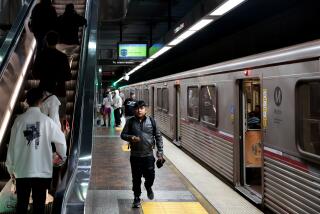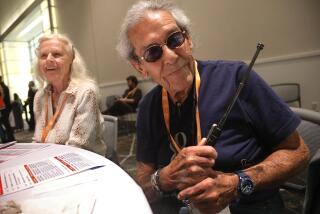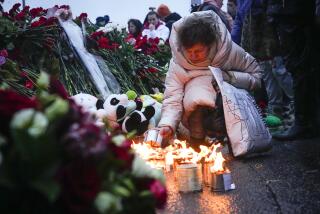SECURITY BEEFED UP FOR BOLSHOI TROUPE
- Share via
Balletomanes heading for Bolshoi Ballet performances at the Dorothy Chandler Pavilion in the next three weeks would be well-advised to copy current airport procedures and allow extra time for check-in.
While local officials have refused to divulge the exact nature and extent of Bolshoi security, The Times has learned that all four cities on the tour (New York, Washington, San Francisco and Los Angeles) have agreed to such measures as metal detectors, extensive handbag and package searches and double-checking of ticket stubs at intermissions. They also agreed to observe a ban on standing-room tickets.
These and other security measures will be stringent in the wake of last fall’s tear-gas bombing of New York’s Metropolitan Opera House during the Moiseyev Dance Company’s opening-night performance.
Local FBI and Sheriff’s Department representatives refused to discuss Music Center security arrangements (including the role of the KGB officers accompanying the Bolshoi troupe) and Dixie Burton, general manager for the James Nederlander Organization--the local Bolshoi presenter--would say only “Security will be adequate.”
However, Lt. Dan Cooke, Los Angeles Police Department press relations officer, said, “There are usually multiple agencies involved in an event like this. It depends on location, who it is, the time in our history, whether there have been prior problems or threats--a number of factors. Since the Music Center is county-owned, the Sheriff’s Department is responsible for security inside the building and up to the sidewalk. The LAPD supervises the sidewalk and streets.”
Bolshoi presenters in other tour cities were generally sympathetic with the Los Angeles news blackout. “I would have been more reticent about talking before the dancers arrived,” said Washington’s Kennedy Center media relations director Tiki Davies. “It’s understandable. We’re always concerned about security ahead of time.”
Elizabeth Lynch, press office spokesperson for the San Francisco War Memorial Opera House, agreed, saying that “before the Bolshoi arrived, we were much more paranoid and close-mouthed about the arrangements--it’s only after the opening (Aug. 4), when things are going smoothly, that you feel you can talk freely.”
In spite of tight security, theater staff members in all cities reported that their daily work pattern was disrupted only minimally, with special identification badges seeming to be the major restriction. An employee at the Dorothy Chandler Pavilion who agreed to discuss the situation only if he could remain anonymous noted that such heavy security was last used for the Academy Awards.
“Some of the Russians came here from New York a few months ago to check out the rehearsal and performing spaces,” he said, “but other than that it’s been quiet. It will probably be normal and no one will pay much attention. If you ask me, they’ve overdone the fuss.”
For employees dealing with the dance public, however, the Bolshoi has hardly represented business as usual.
“Opening night (in San Francisco) was incredible,” Lynch reported. “There were lines around the block and a 10-minute curtain delay to get people to their seats. But we added an extra metal detector the next day and there was no problem with the matinee.”
Opera House official Elizabeth Blaze said, “We haven’t had security like this since the 1951 Japanese Peace Treaty signing, and never of this scope. The FBI recommended these safety measures, the public has been very cooperative with them and the media have helped by alerting the audiences to allow more time.”
On the Soviets’ own security efforts, Blaze would say only that “you can’t tell about the KGB. They take very subtle precautions and you don’t really know who’s who.”
While extensive security precautions were unusual in San Francisco, the picture was different in Washington, where the Bolshoi opened July 21. “Washington is used to this,” said Davies, “and it went remarkably smoothly. Ever since the Moiseyev tour, we’ve used magnetometers each time the President attends and also for the Moscow Philharmonic Orchestra.
“Besides the Metropolitan Police, we also used the Park Service because the center is a national monument, and they’re pros at this routine. There may have been some State Department involvement too. Security forces were definitely increased a lot but I can’t say by how many--it’s our policy not to give out such information.”
Opening night in San Francisco was marked by a demonstration by the Bay Area Council for Soviet Jewry, and a similar “silent demonstration” is planned for tonight’s Music Center opening, according to Beth Hirsh, director of the Commission on Soviet Jewry from the Jewish Federation Council.
“Our message,” Hirsh said, “is that (the Soviet government policy of) glasnost (openness) is not working for Soviet Jews. In Russia there’s freedom of movement for dancers but not for Jews.”
Bolshoi opening-night events in New York on June 30 included a bomb scare at the Met, with an unarmed grenade found in a garbage can. However, tour press representative Kevin McAnarney minimized potential danger, pointing out that bomb squads perform routine daily sweeps at each theater on the tour.
“Apart from that one incident,” he said, “everything went smoothly. We sent brochures to our patrons in April that explain the procedure, so everyone knew in advance that the house would open a half-hour early and there would be searches.
“There were longer lines in New York than in Washington, probably because the Met holds 4,000 and Kennedy Center seats about 2,200. The Met usually has a big security force anyway, but in this case it was increased substantially to supervise the ticket holders and the hundreds of people who lined up for hours waiting for cancellations.”
No one queried by The Times would cite specific costs for additional security personnel and it was not clear how these costs are divided. McAnarney said each city makes different arrangements, while Lynch commented, “Security costs are part of the cost of touring. The presenters in each city are responsible for it.”
A Music Center operating company staff member who wished to remain anonymous said, “Figuring the cost for security is always complicated. We pay for our own security staff, the production company pays some and the government will probably pay some.”
It was also not possible to determine the number of agencies and personnel involved in security enforcement, although Lynch said that “we used about 40 extra people from outside security firms and the FBI and San Francisco Police Department worked with our in-house staff.”
As for the Bolshoi itself, the 180-member touring company, which includes stagehands, musicians and costumers, as well as dancers, appears to have been less restricted than its fans. “Our security precautions have really been for the protection of audiences, not dancers,” said McAnarney.
“They’ve been free to come and go as they please. We’ve had shuttle buses to transport them from their hotels to the theaters, but many of them preferred to walk and shop along the way.”
From Washington, Davies reports that “ in general, the atmosphere was relaxed and casual, more so than when the Moiseyev were here. There was even some family-type entertainment. Our head carpenter, Mickey Berra, became friendly with some of the dancers and invited them home for a barbecue. We’re pleased it went well and the dancers were welcomed warmly.”
More to Read
The biggest entertainment stories
Get our big stories about Hollywood, film, television, music, arts, culture and more right in your inbox as soon as they publish.
You may occasionally receive promotional content from the Los Angeles Times.










